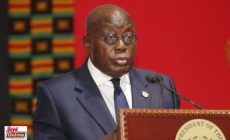Gov’t warned over abandoning IMF deal
- Posted on
- Comment
 Some economists are warning Ghana against any move to abandon its program with the International Monetary Fund (IMF).
Some economists are warning Ghana against any move to abandon its program with the International Monetary Fund (IMF).
One of such is a senior lecturer at the University of Ghana, Dr. Lord Mensah who says any such move is likely to reduce investor confidence in the country.
Dr Lord Mensah in an interview with Accra based Citi FM cautioned government over going off the IMF programme as it could lead to the collapse of the Ghanaian economy.
“There is no IMF programme that comes in a soft form; every IMF programme or rescue comes in a form of pain or sacrifice. You went to the IMF in such a way that you are not financially disciplined and you want the IMF to come and help you , so that in the end, your economy would be on a good footing and ensure that you stay financially disciplined; then suddenly you turn around that you cannot hold onto those conditions that they are giving you,”
“Do you know the signals you are sending out there as far as any investor who has interest in this economy is concerned?” he queried.
Dr Lord Mensah further stated that “when you go to the Eurobond market to raise money to support your economy, they are given in such a way that the external or the internal investor sees that the IMF has monitored this country [Ghana] to place it in such a way that it will spend prudently with all the financial resources that comes into the country’s fold.”
He argues that the IMF programme is to give some guarantee for investors who wish to buy into the country’s bond issue.
Dr Lord Mensah’s assertion follows calls by some economists as well as labour groups including the Trades Union Congress (TUC) and the Managing Director of the Ghana Growth Fund Company (GGFC), Kwame Ofori Asomaning that, government should forfeit austerity measures with the IMF and spend to save the country form its economic woes.
According to them, the private sector relies on government’s expenditure to expand, hence any decision to undertake austerity measures will stifle the private sector from generating funds.
This also follows government’s move to meet the International Monetary Fund (IMF)’s conditions, which among others require the government of Ghana to cut down expenditure to enhance fiscal discipline.
Analyzing the three main sectors that are key in stimulating economic growth, Mr. Asomaning stated that the government sector, the private sector and foreign sector require good management to attain stability.
He stated that focusing on the private sector will not only expand the sector but have a multiplier effect that will lead to job creation.
-The Finder










 (Selorm) |
(Selorm) |  (Nana Kwesi)
(Nana Kwesi)